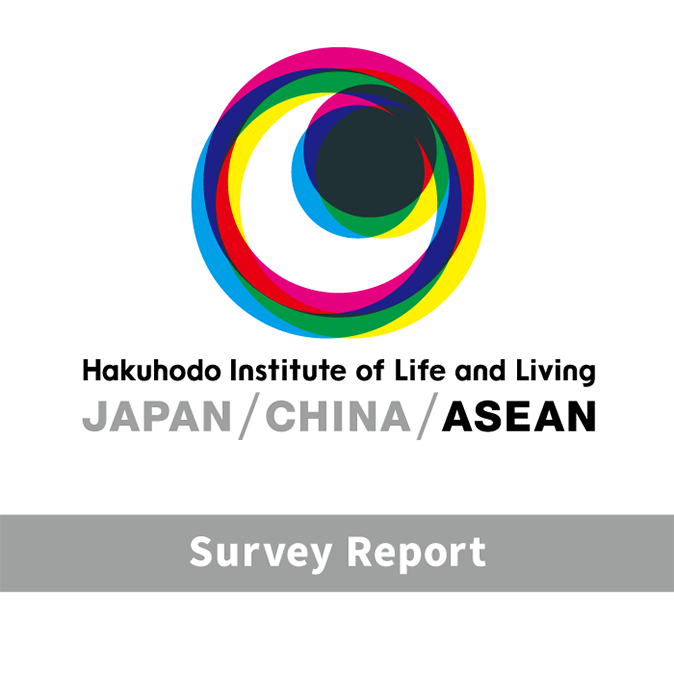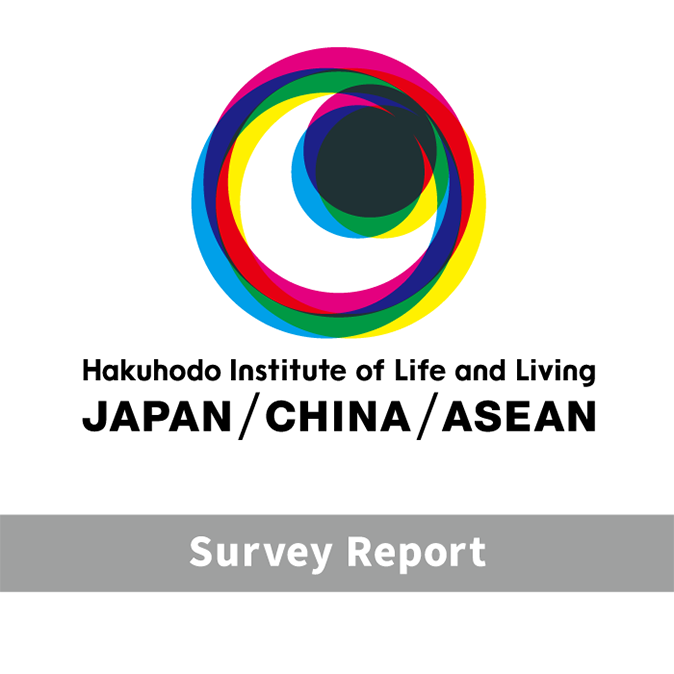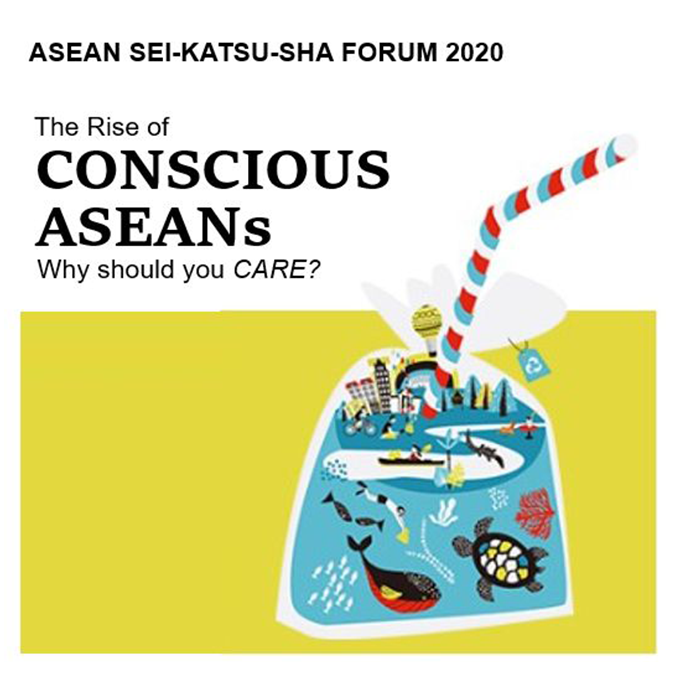- Viewpoints
- Research
- HILL
The Covid-19 pandemic has affected the behavior of sei-katsu-sha across the globe in every way, but in different ways and levels depending on the country.
In July, Hakuhodo Institute of Life and Living ASEAN (HILL ASEAN) conducted the Survey of ASEAN Sei-katsu-sha’s Attitudes to COVID-19 for the second time this year. In this article, Takashi Kanamori, Regional Strategic Planning Director at HILL ASEAN, reports on the changes, characteristic attitudes and behavior among sei-katsu-sha in the region, based on quantitative and qualitative surveys conducted in six ASEAN countries, including a comparison with the findings of the first survey conducted in March 2020.
Over 90% of lives remain changed by COVID-19
Asked about the impact of COVID-19 on their lives in the July survey, 96% of respondents, up from 94% in March, said “My life has changed significantly” or “My life has changed somewhat,” indicating that the pandemic has had a great impact on sei-katsu-sha.
At the time of the survey, the extent of COVID-19 varied considerably depending on the country. In Thailand, Vietnam and Malaysia, new infections had slowed, allowing the resumption of commuting, eating out and shopping, whereas the pandemic still raged in Indonesia and the Philippines, with daily infections exceeding 1,000.* Thus, the two surveys painted a mixed picture: the impact on sei-katsu-sha was substantial in Indonesia, the Philippines and Singapore as the pandemic was still wreaking havoc, but had begun to recede in Thailand, Vietnam and Malaysia due to the slowdown in new infections.
*COVID-19 is still spreading in Indonesia and the Philippines as of October 2020.
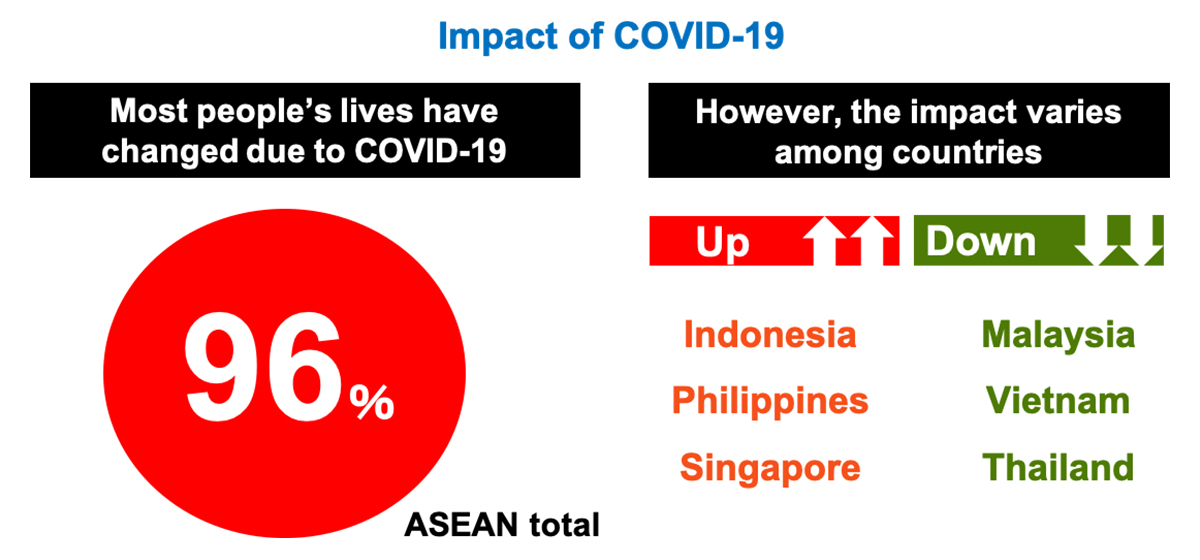
Impact on households and community ties
In addition to the pandemic itself, the deteriorating economy due to lockdown and other national policies and the falling incomes of sei-katsu-sha are also major concerns in ASEAN countries. Indeed, 91% of the sei-katsu-sha responded “I started to wonder whether items were essential or not” when buying things. Under the harsh circumstances, sei-katsu-sha and local communities now support each other more closely, trying to navigate the pandemic with new ideas.
For instance, grass-roots movements in Thailand include a Happiness Cabinet, where sei-katsu-sha can freely give or take daily essentials such as food and FMCGs. The cabinet, first set up by volunteers during the pandemic, has become a huge movement that has been replicated across the country. There has been a surge in mutual-help activities among the population in various countries, driven by affection for and pride in their own country and community, such as reinventing those crafts and specialties traditionally sold to tourists for domestic consumption.
Adapting to the “new normal” but “wanting to go back to how things were before COVID-19”
Asked if they “Want to embrace COVID-19–related changes (= prefer the new normal)” or “Want to go back to how things were before COVID-19 (= prefer pre–COVID-19),” the respondents tended to prefer their previous lives in ASEAN countries as a whole.
High scores for “Want to go back to how things were before COVID-19” were observed concerning “Travel/Leisure,” “Relationships with friends/partner,” “Children’s education,” “Relationships with people around me,” and other areas where substantial restrictions have been placed on activities and interactions due to the pandemic. Areas with high scores for “Want to embrace COVID-19–related changes” include “Information gathering,” “Health,” “Relationships with family members,” and “Mealtimes” among others.
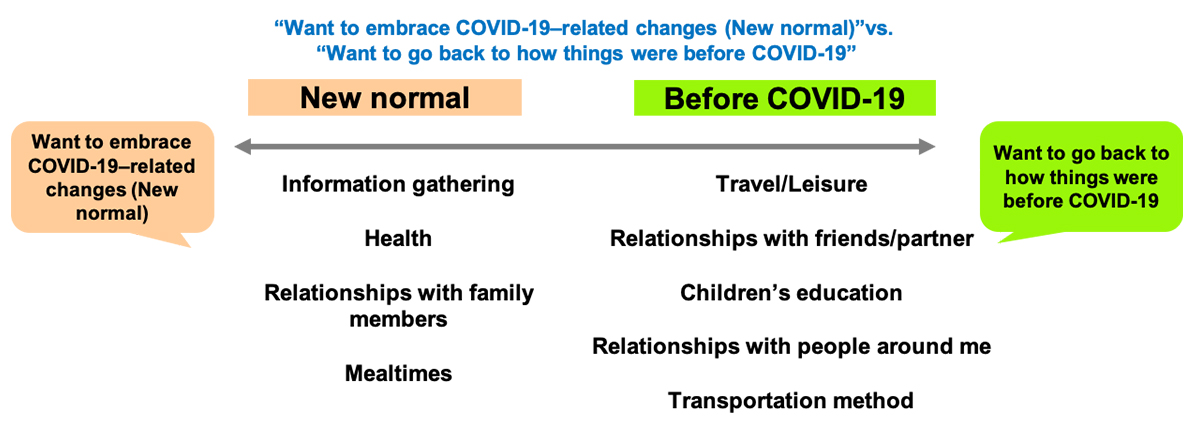
Rapid rise in online purchasing by sei-katsu-sha
The findings of the survey regarding “changes in expenses” reveal a substantial change in purchasing and acceptance of the “new normal” shopping behavior.
The results indicate a trend similar to that of the March 2020 survey as a whole, with the notable exception of “Online shopping,” which showed a significant increase of 23 points (*22.8% before rounding) in the whole ASEAN region from 40% to 62%. Coupled with a substantial rise of 14 points year-on-year in “Food delivery,” the results show that sei-katsu-sha are shifting to purchasing online.
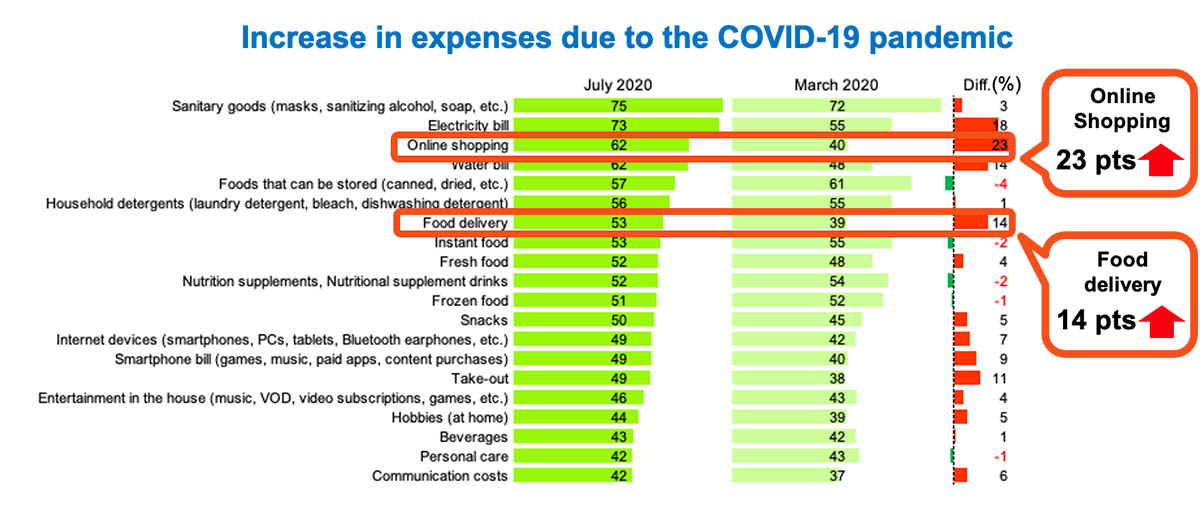
Even though “Cashless payment” has attracted widespread attention in ASEAN for several years, it is the pandemic that has caused rapid growth of the service and the number of users, as people started to recognize its benefits in terms of “Protection against the pandemic” as well as its traditional merit of “Convenience.” HILL ASEAN is closely monitoring this digital shift among sei-katsu-sha in ASEAN countries.
Desire of ASEAN sei-katsu-sha and marketing opportunities in the post-pandemic era
Based on the findings, HILL ASEAN has summarized the desire of sei-katsu-sha and marketing opportunities for businesses in ASEAN as follows.
Mixed feelings prevail among sei-katsu-sha in ASEAN, characterized by lingering anxiety (“COVID-19 is not over yet”) and positive outlook (“Want to do things I could not during lockdown”).
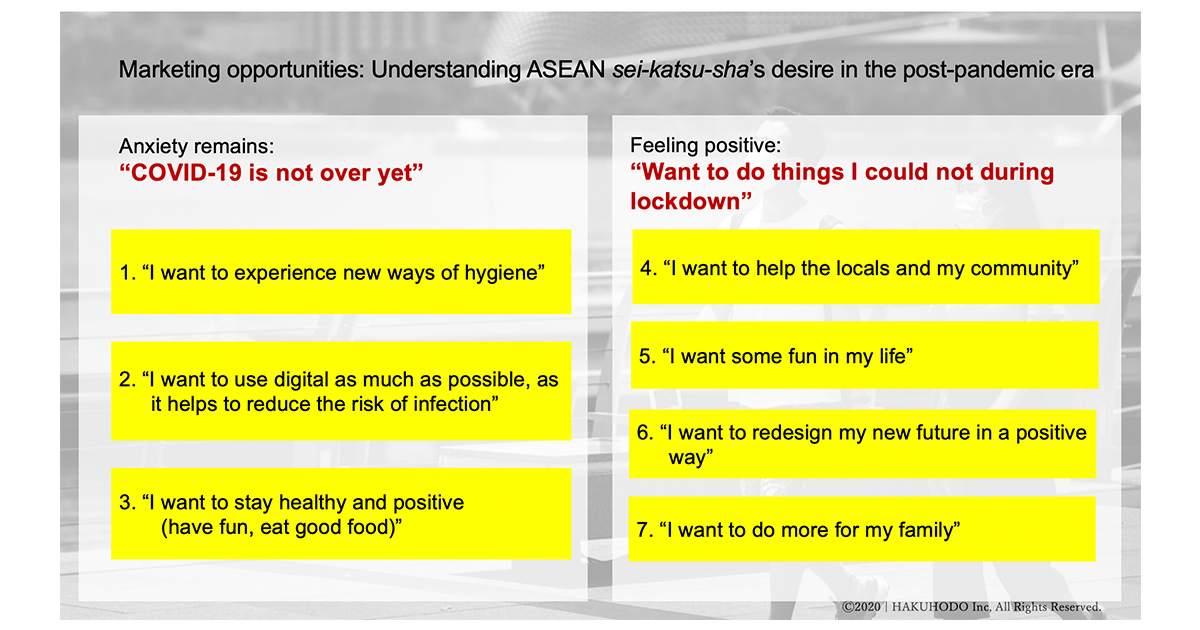
Lingering anxiety: “COVID-19 is not over yet”
1. “I want to experience new ways of hygiene.”
Although it is essential to keep taking precautions, inertia and weariness can easily set in. Businesses may wish to propose novel actions against the pandemic that attract public interest or look good on SNS, rather than strict “requirements,” so that sei-katsu-sha can keep doing them at their own initiative.
2. “I want to use digital as much as possible, as it helps to reduce the risk of infection.”
Digital technology, which has been adopted for its convenience thus far, will be embraced and constantly used by men and women of all ages to “avoid the risk of transmission.” The development of digital touchpoints will need to focus on the behavior and practice of sei-katsu-sha in ASEAN as they become essential rather than optional.
3. “I want to stay healthy and positive (have fun, eat good food).”
The need will emerge for solutions suited to health-conscious attitudes in the post-pandemic era that sei-katsu-sha acquired during self-isolation: “I want to build up immunity.” “I want my family to stay healthy.” “I want to stay in shape while working from home.” “I want to stay healthy without too much effort.” Simple and attractive value propositions are needed to accompany the positive mindset of the ASEAN population.
Against the backdrop of lingering concern among sei-katsu-sha, we saw commercial facilities across ASEAN that take visible “inducing” measures against the pandemic to enable sei-katsu-sha to go about their daily life in security. Whereas commercial facilities in Japan generally place commercial alcohol gel at the entrance, preventive measures in ASEAN countries tend to be more visible and on a larger scale. Thus, a high-class shopping mall in Thailand ostentatiously has a unique, tunnel-shaped “sterilizing entrance gate” automatically spraying a disinfectant; there is nothing like this in Japan.
Other companies are more focused on entertaining sei-katsu-sha, like a restaurant chain in Thailand that “reserves” some of the tables for its mascot characters as a social distancing measure. These examples show the positive attitude and creativity typical of ASEAN sei-katsu-sha, who are trying to overcome their fears amid COVID-19.
Positive outlook: “Want to do things I could not during lockdown”
4. “I want to help the locals and my community.”
Mobilization “for the good of my country” is one of the drivers of post-lockdown consumption behavior. Successful control of the disease has been accompanied by a surge in patriotism, so businesses may wish to stimulate domestic activities by demonstrating to sei-katsu-sha how they are providing support, and to whom.
5. “I want some fun in my life.”
Now that restrictions have been eased, sei-katsu-sha in ASEAN are looking to enjoy doing things they could not during lockdown. Businesses and brands may wish to prepare for helping people have fun and fulfill their desires, while introducing a broad range of infection control measures.
6. “I want to redesign my new future in a positive way.”
COVID-19 has done more than change lifestyles: it has also caused a vague sense of uncertainty and anxiety. People don’t know what the future holds. Sei-katsu-sha must now reinforce their ability to overcome any adversity. They are looking for positive value propositions to “redesign” their own future and their family’s future in any way possible, such as side jobs, qualifications or insurance.
7. “I want to do more for my family.”
Strong family ties are a traditional characteristic of sei-katsu-sha in ASEAN. Now that the peak of the pandemic has passed, they are feeling even more grateful for the human bonds they enjoy. Consumption behavior will be increasingly driven by the desire to support their families, to show that they care.
Despite the prevailing cautiousness and anxiety, proactive consumption behavior has emerged particularly in countries where new infections are under control.
In Thailand, Vietnam and Malaysia, for example, the government and tourism industry have been providing support and discounts to promote domestic travel to compensate for the decline in inbound tourists. For sei-katsu-sha, such measures provide opportunities to rediscover the beauty of nature and the attractions of their own country, as well as financial benefits. Apparently, sei-katsu-sha are driven not only by their personal desire to enjoy traveling after being cooped-up in self-isolation but also by their wish to help their local community and nation by traveling.
Thus, the COVID-19 pandemic has had substantial impacts on sei-katsu-sha in ASEAN, with various effects depending on the country. Businesses will need to follow the distinct attitudes and feelings of sei-katsu-sha in each country based on a full understanding of the latest changes in emerging behaviors. Although some major changes are already visible, the transformation of sei-katsu-sha due to COVID-19 is still ongoing. We will continue to monitor, study and analyze the behavior of sei-katsu-sha in ASEAN countries in order to distinguish between temporary, reversible events and structural changes that will form an integral part of the new lifestyle.
HILL ASEAN will continue to provide regular bulletins and reports on the changing trends of sei-katsu-sha in the region.
Respondents: Males and females 20-49
Territories: Thailand, Indonesia, Singapore, Malaysia, Vietnam, Philippines
Samples: 300 in each country, 1,800 samples total
Survey method: Internet survey
Survey period: July 10–13, 2020
Qualitative survey
Territories: Thailand, Indonesia, Singapore, Malaysia, Vietnam, Philippines
Survey method: Desk research conducted by HILL ASEAN researchers in each country
Survey period: July 2020
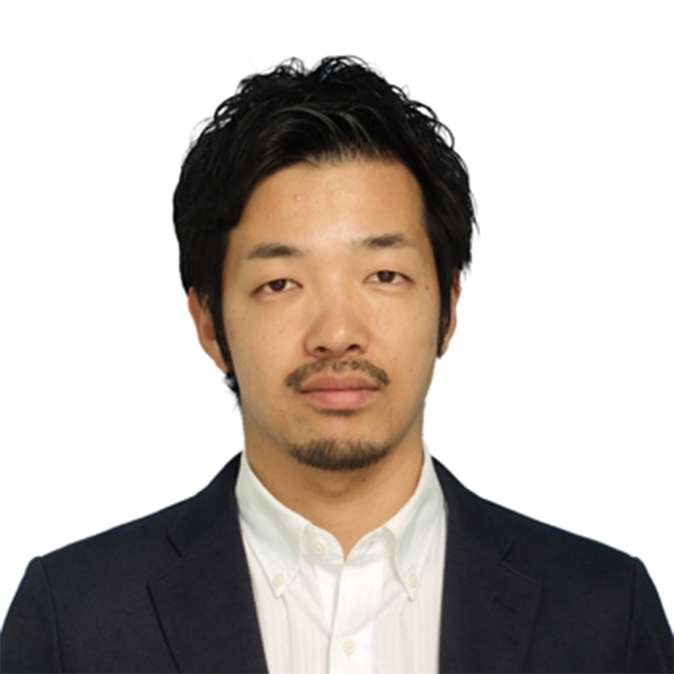
Hakuhodo Institute of Life and Living ASEAN














